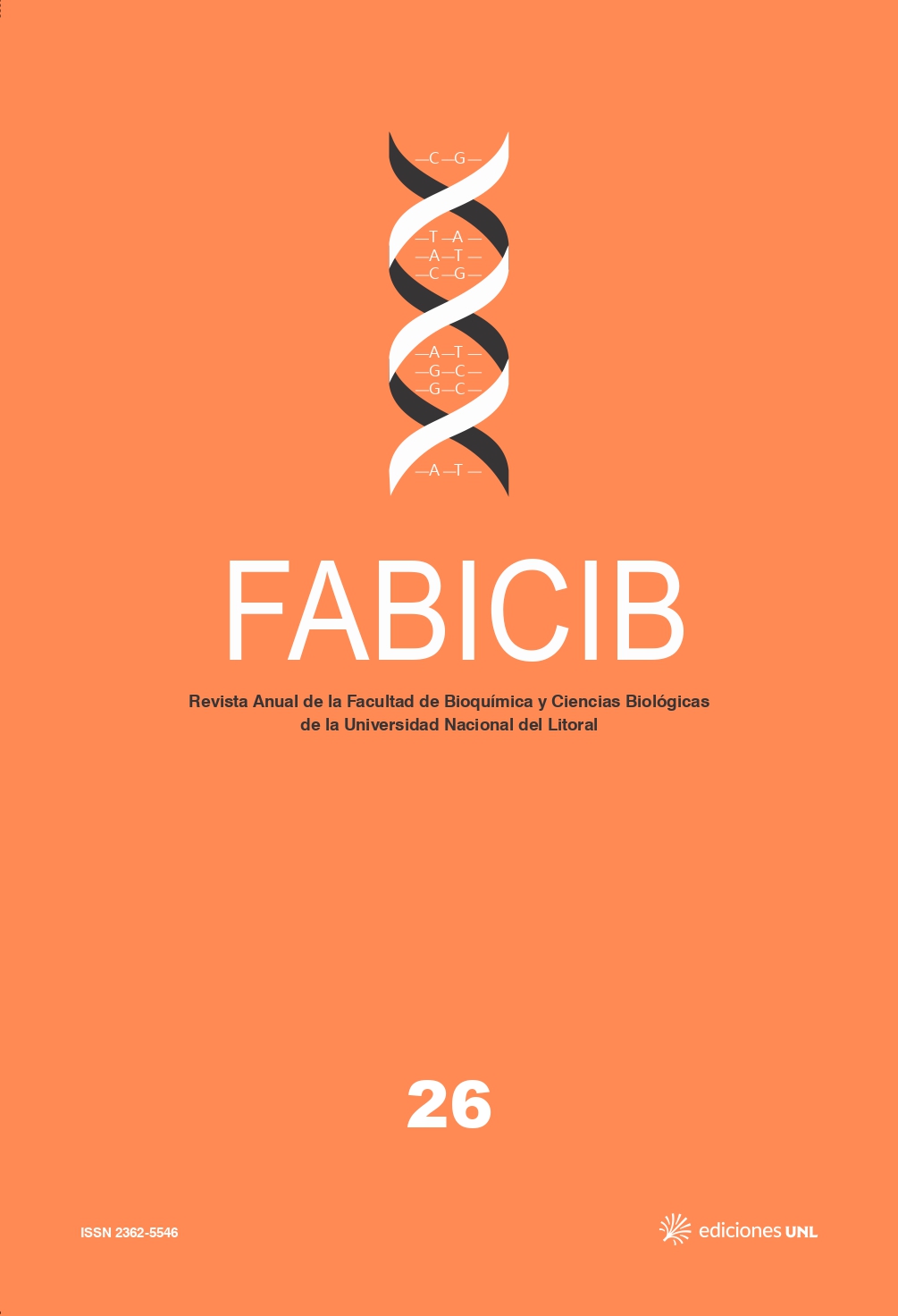Food transition: towards healthier and more sustainable menus in the municipal Dining Room of the city of Rincón (Santa Fe): Exchanges of knowledge and practices with students of the subject Sociantropología de la Alimentos (FBCB-UNL)
DOI:
https://doi.org/10.14409/fabicib.v26i2.12270Keywords:
social space, municipal Rining Room, healthy eating, citizen participationAbstract
In the following pages we will present the analysis of the results obtained from the questionnaires made to the personnel who work and manage the Municipal Dining Room of Rincón as well as to some members of the living groups that collect their food daily. They were prepared and implemented in 2020 by the team of professors and students of the subject Socioanthropology of Nutrition of the degree in Nutrition (Universidad Nacional del Litoral) within the framework of the experiential education proposal: "The Municipal Dining Room of Rincón: exchanges of knowledge and practices with the students of the subject Socioanthropology of Nutrition (FBCB-UNL) ”. It should also be clarified that there was the collaboration of officials and employees of the Municipality of Rincón, since this project was viable from the agreement carried out by the Practical Health Experience Program, promoted by the Student Center of the Faculty of Biochemistry and Sciences Biological and the Municipality of San José del Rincón (Santa Fe). Therefore, the context chosen to work was the Municipal Dining Room of said locality. The main reason of that choice was the need of those who work daily in that place to specify certain changes around the conception of generating a new space that provide a healthier and more sustainable food proposal, mainly taking advantage of local food resources. This resignification of the Dining Room implies “transforming it into an integral and participatory space linked to gastronomy in its broadest sense, an active space for feedback, a social and productive space where workshops are held, the construction of enterprises, orchards, that enables communication with the population, etc. " (Mujica, 2018: pp. 1,2). Based on this interest, we will present the analysis carried out in relation to the following theoretical-empirical approaches: contextualization of the eating practices of the workers, assistants and other social actors who attend the Dining Room daily. Interpretations and meanings that are had at the local level about healthy and organic eating. Recognition of food identity links shared by people in the Municipal Dining Room.
References
Abeyá, E. (2016) Una evaluación crítica de los programas alimentarios en Argentina. Salud Colectiva - Universidad Nacional de Lanús.
Aguirre, P. (2018) Una Historia social de la comida. Buenos Aires. Ed. Lugares
La construcción social del gusto en el comensal moderno. (2011) En: Comer. Puentes entre la alimentación y la cultura. Ed. Libros del Zorzal, Buenos Aires.
Estrategias domésticas de consumo: las representaciones Cap. 5 (2005). En: ¿Qué comen los argentinos, que comen? (selección) Ed. Miño y Dávila. Bs. As. (155- 196).
Archenti, Nélida (2007) Cap. 11 “El sondeo”. Metodología de las ciencias sociales. Marradi Alberto, Archendi Nélida y Piovani Juan Ignacio. Buenos Aires. Emece editores.
Contreras Hernández y Gracia Arnáiz (2005). Alimentación y cultura. Perspectivas antropológicas (selección). España. Ed Ariel.
Contrera L y Cuello N. (2016) Cuerpos sin patrones: resistencias desde las geografías desmesuradas de la carne, Ciudad Autónoma de Buenos Aires, Ed. Madreselva.
De Garine, Igor (2010) Conferencia inaugural Alimentación y Cultura: Antropología de la Alimentación. IV Jornadas de Antropología de la Alimentación, Nutrición y Salud: alimentación y globalización. Bilboa. España.
Fischler, C. (1995) El (h) omnívoro. El gusto, la cocina y el cuerpo. Barcelona. Ed. Anagrama.
Mujica, Sebastián (2018) Hacia una política pública de Nutrición integral: Resignificando el comedor comunitario. Documento de uso interno elaborado por la Secretaría de Desarrollo de la Municipalidad de Rincón.
Patel, R (2009) Obesos y Famélicos. Globalización Hambre y Negocios en el Nuevo Sistema Alimentario Mundial. Marea. Buenos Aires.
The Lancet Comissions (2019) “Food in the Anthropocene: the EAT–Lancet Commission on healthy diets from sustainable food systems”. En Willett, W.; et all. VOLUME 393.
Valles, Miguel S. (1999) Técnicas cualitativas de investigación social. Reflexión metodológica y práctica profesional. España: Edit. Cultura libre.
Zafra Aparici, E. (2017) Educación alimentaria: salud y cohesión social. Salud Colectiva [online]. 2017, v. 13, n. pp. 295-306. Disponible en: https://doi.org/10.18294/sc.2017.1191.
Con Ganas Se Puede - Comedor Comunitario Rincón. Disponible en: https://www.youtube.com/watch?v=i5dKAhSArIM&t=182s
Kiaora Gastronomía Social. Disponible en: http://kiaoragastronomiasocial.com/gastronomia-social
Municipalidad San José del Rincón. Disponible en: https://www.municipalidad-argentina.com.ar/municipalidad-san-jose-del-rincon-s.html
Published
How to Cite
Issue
Section
License
Copyright (c) 2022 FABICIB

This work is licensed under a Creative Commons Attribution-ShareAlike 4.0 International License.


